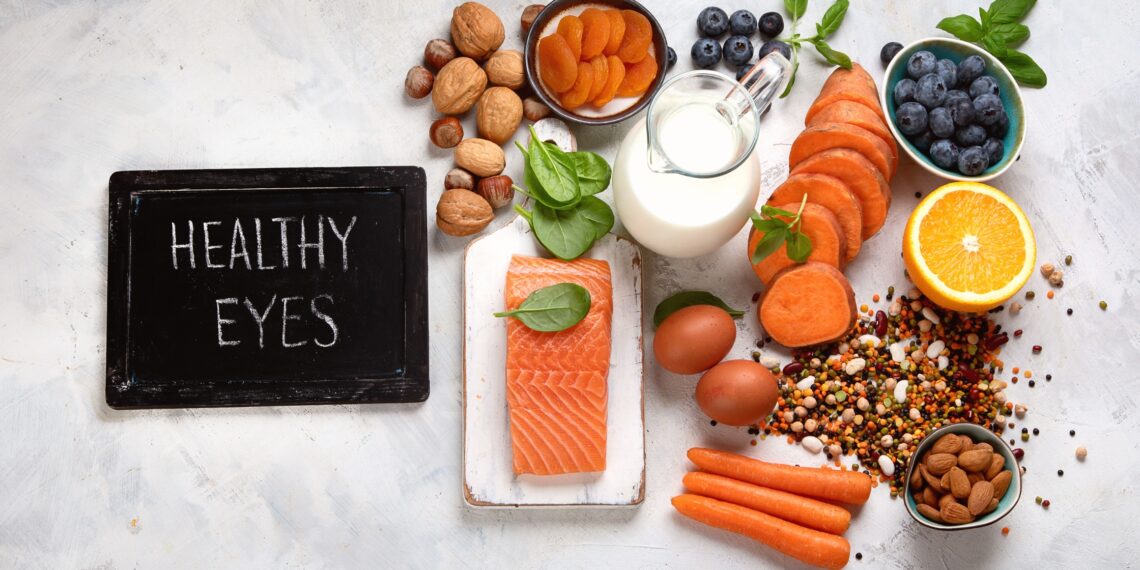They say that eyes are the windows to the soul, but did you know that they can also be a reflection of your overall health? Our eyes work tirelessly every day, allowing us to see and experience the beauty of the world around us. So why not give them the care and attention they deserve?
In this blog post, we’ll delve into the fascinating connection between nutrition and eye health. We’ll explore which nutrients play a crucial role in maintaining optimal eye function, how our diet can impact common eye problems, and what steps you can take to nourish your eyes for lifelong clarity.
Get ready to embark on an enlightening journey as we uncover the secrets to keeping your peepers happy and healthy. From delicious foods packed with essential vitamins to lifestyle habits that promote ocular well-being – it’s time to nourish those precious orbs of yours like never before!
What nutrients are important for eye health?
When it comes to maintaining healthy eyes, nutrition plays a vital role. Certain nutrients are especially important for supporting eye health and protecting against various eye conditions. So, what exactly are these key nutrients?
First up is vitamin C. This antioxidant-rich nutrient helps protect the delicate structures of the eye from damage caused by harmful free radicals. It also supports the health of blood vessels in the retina, reducing the risk of age-related macular degeneration (AMD).
Next on our list is omega-3 fatty acids. These healthy fats play an essential role in preventing dry eyes and reducing inflammation in the eyes. They can be found abundantly in fish like salmon and sardines.
Another crucial nutrient for eye health is vitamin E. With its powerful antioxidant properties, vitamin E helps safeguard cells within the eyes from oxidative stress and may reduce the risk of developing cataracts or macular degeneration.
Zinc is also important for maintaining good vision as it contributes to the production of melanin, a protective pigment found in both the eyes and skin. Additionally, zinc aids in transporting vitamin A from your liver to your retinas which is necessary for optimal vision.
Last but not least are lutein and zeaxanthin, carotenoids that act as natural filters against harmful blue light waves while promoting overall ocular health. These compounds accumulate mainly in our retinas’ maculae where they help absorb excess light energy that could potentially harm our vision.
Ensuring you get enough of these essential nutrients through a balanced diet rich in fruits, vegetables, healthy fats like nuts and seeds, lean proteins such as fish or poultry can significantly contribute to maintaining optimal eye health throughout life.
How does nutrition affect eye health?
Proper nutrition plays a vital role in maintaining optimal eye health. The food we eat provides essential nutrients that support the function and structure of our eyes. So, how does nutrition affect eye health?
One important nutrient for eye health is vitamin C, which acts as an antioxidant and helps protect the cells in our eyes from damage caused by free radicals. Foods rich in vitamin C include citrus fruits like oranges and grapefruits, as well as strawberries and bell peppers.
Omega-3 fatty acids are another crucial component of a healthy diet for your eyes. These healthy fats help prevent dry eyes by reducing inflammation in the tear glands. Fish such as salmon, sardines, and tuna are great sources of omega-3s.
Vitamin E also plays a role in maintaining good eye health. It protects cell membranes from oxidative damage and supports overall ocular function. Nuts like almonds and sunflower seeds are excellent sources of vitamin E.
Zinc is another mineral that benefits eye health by supporting the absorption of vitamin A, an essential nutrient for vision. Oysters, beef, poultry, beans, and nuts contain high levels of zinc.
Finally, carotenoids are pigments found in many fruits and vegetables that can help protect the eyes from oxidative damage. Foods high in carotenoids include leafy greens, carrots, squash, and sweet potatoes.
Additionally, lutein and zeaxanthin are carotenoids found in leafy green vegetables like kale or spinach that have been shown to reduce the risk of age-related macular degeneration (AMD), one of the leading causes of vision loss among older adults.
Incorporating these eye-friendly nutrients into your diet can help nourish your eyes from within! By choosing foods rich in vitamins C and E, omega-3 fatty acids, zinc, lutein,and zeaxanthin you can give your eyes the support they need to stay healthy.
What are some common eye problems?
Our eyes are delicate organs that can be susceptible to various issues and conditions. Understanding the common eye problems that many people face can help us take better care of our vision.
One common eye problem is dry eye, which occurs when the eyes do not produce enough tears or the tears evaporate too quickly. This can lead to discomfort, redness, and a gritty sensation in the eyes.
Another frequent issue is age-related macular degeneration (AMD), which affects the macula at the back of the eye responsible for central vision. AMD can cause blurred or distorted vision and may progress over time, leading to significant vision loss.
Cataracts are also prevalent among older adults. These occur when protein builds up on the lens of the eye, causing cloudiness and reduced visual clarity.
Diabetic retinopathy is an eye condition that develops in individuals with diabetes. It occurs when high blood sugar levels damage blood vessels in the retina, potentially leading to vision loss if left untreated.
Glaucoma is another common problem characterized by increased pressure within the eye. If undiagnosed or unmanaged, it can result in optic nerve damage and permanent vision loss.
Regular check-ups with an optometrist or ophthalmologist are crucial for early detection and treatment of these common eye problems. Additionally, practicing good overall health habits such as maintaining a balanced diet rich in essential nutrients may help reduce your risk of developing certain eye conditions. Stay proactive about your ocular health for clear sight now and in years to come!
How can you prevent or reduce the risk of developing eye problems?
Preventing or reducing the risk of developing eye problems is crucial for maintaining good vision and overall eye health. While some factors, such as genetics and age, may be beyond our control, there are several steps we can take to protect our eyes.
One important aspect is adopting a healthy lifestyle that includes a balanced diet rich in nutrients beneficial for eye health. Including foods like leafy greens (such as kale and spinach), colorful fruits and vegetables, fish high in omega-3 fatty acids (like salmon), and nuts can provide essential vitamins and minerals necessary for optimal eye function.
Regular exercise also plays a significant role in keeping your eyes healthy. Physical activity improves blood circulation throughout the body, including the tiny blood vessels in the eyes. Additionally, maintaining a healthy weight can help reduce the risk of developing conditions like diabetes, which can lead to diabetic retinopathy—a common cause of vision loss.
Protecting your eyes from harmful UV rays by wearing sunglasses whenever you’re outdoors is another vital step. Prolonged exposure to sunlight without proper protection increases the risk of developing cataracts and other sun-related eye conditions.
Another important factor to consider is giving your eyes regular breaks from digital screens—whether it’s your computer at work or your smartphone at home. The constant strain on our eyes from staring at screens all day can result in dryness, discomfort, blurred vision, or even digital eyestrain syndrome.
Lastly but certainly not leastly: don’t forget about regular visits to an optometrist or ophthalmologist! These professionals specialize in assessing your overall eye health and detecting any potential issues early on when they’re easier to treat.
By incorporating these preventive measures into our daily lives, we can significantly reduce the risk of developing various eye problems—and keep enjoying clear vision well into the future!
FAQ About Nutrition and Eye Health
Q: What is the connection between nutrition and eye health?
A: Nutrition plays a crucial role in maintaining healthy eyes. Certain vitamins and nutrients are essential for proper eye function and can help prevent or slow the progression of certain eye diseases.
Q: How do vitamins and nutrients affect eye health?
A: Vitamins such as vitamin C, vitamin E, and zinc, as well as nutrients like lutein and zeaxanthin and omega-3 fatty acids, have been found to be beneficial for ocular health. They can reduce the risk of developing an eye disease and enhance overall eye function.
Q: What specific eye diseases can nutrition help prevent?
A: Proper nutrition can lower the risk of age-related eye diseases such as macular degeneration and cataracts. It is also helpful in reducing the symptoms of dry eye.
Q: What are the best food sources for eye health?
A: Fruits and vegetables, particularly those rich in vitamins and nutrients, are the best sources of nutrition for eye health. Examples include leafy greens, citrus fruits, berries, and fish rich in omega-3 fatty acids.
Q: How does a Mediterranean diet contribute to eye health?
A: A Mediterranean diet, which includes a variety of fruits, vegetables, whole grains, healthy fats, and fish, has been associated with a lower risk of chronic eye diseases. The nutrients found in this diet are known to have important roles in maintaining healthy eyes.
Q: Can taking vitamin supplements improve eye health?
A: While a balanced diet is the best way to obtain essential nutrients for eye health, vitamin supplements can be beneficial for those who have difficulty meeting their nutritional needs through diet alone. It is important to consult with a healthcare professional before starting any supplements.
Q: What did the Age-Related Eye Disease Study (AREDS) find?
A: The Age-Related Eye Disease Study (AREDS) found that a combination of high-dose antioxidants (vitamin C, vitamin E, and beta-carotene) and zinc can slow the progression of age-related macular degeneration (AMD) in people at high risk.
Q: What did the Age-Related Eye Disease Study 2 (AREDS2) discover?
A: The Age-Related Eye Disease Study 2 (AREDS2) further expanded on the findings of AREDS and found that adding lutein, zeaxanthin, and omega-3 fatty acids to the original AREDS formula did not provide additional significant benefits in preventing advanced AMD.
Q: What are the symptoms of dry eye?
A: Dry eye can cause symptoms such as dryness, irritation, redness, itching, and a gritty sensation in the eyes. Some individuals may experience blurry vision or excessive tearing as well.
Q: How can nutrition reduce the risk of developing an eye disease?
A: By consuming a balanced diet rich in fruits, vegetables, and other foods for eye health, you can provide your eyes with the necessary vitamins and nutrients to protect against eye diseases and maintain optimal ocular health.
Conclusion
In closing, it is clear that nutrition plays a crucial role in maintaining eye health. By incorporating a diet rich in key nutrients, such as vitamins C and E, omega-3 fatty acids, zinc, and lutein and zeaxanthin, we can nourish our eyes and reduce the risk of developing eye problems.
Foods like fruits and vegetables, leafy greens like kale and spinach, fish high in omega-3 fatty acids, nuts and seeds, eggs, and lean meats are all excellent sources of these important nutrients. Including them in our daily meals can help protect our eyes from conditions like macular degeneration and cataracts.
It’s also worth noting that good nutrition isn’t just beneficial for our eyes; it also benefits our overall health. A balanced diet not only supports healthy vision but also provides numerous other benefits to different parts of the body.
While proper nutrition is essential for maintaining optimal eye health throughout life, it is equally important to consult with an eye care professional regularly. They can provide personalized guidance tailored to your specific needs.
Remember, taking care of your eyes should be a priority at every stage of life. So let’s make conscious choices about what we eat to nourish our eyes today – because healthy eyes mean a clearer tomorrow!


